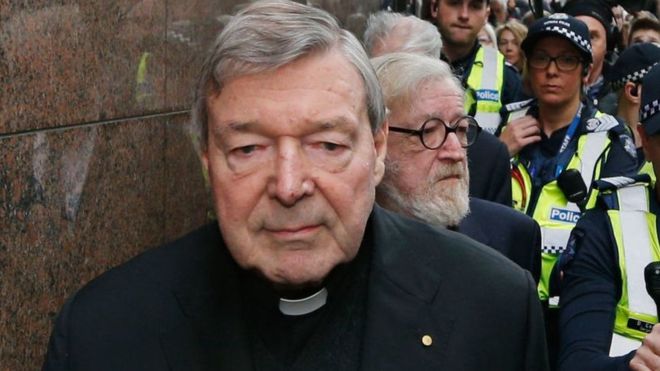George Pell: Why was conviction kept secret?

They were sex abuse allegations that rocked the Catholic Church and generated enormous interest - only for the case to vanish suddenly from public view for nine months.
The trial and conviction of Cardinal George Pell can now be reported after an Australian judge lifted a legal order that had prohibited coverage.
The sweeping ban, known as a suppression order, was handed down last May.
It was deemed necessary to give Pell fair hearings but caused big debate.
Police charged Pell with sex offences in June 2017, saying only that he faced "historical" allegations by "multiple complainants". The cardinal immediately denied any wrongdoing.
Some pre-trial hearings where Pell was swamped by media outside court were allowed to be reported.
Those hearings revealed for the first time that Pell faced separate accusations from the 1990s and the 1970s. Consequently, a judge ordered that two trials - with separate juries - would take place.
In a bid to prevent the first trial influencing the second, the judge agreed to an immediate suppression order.
It made it illegal to report that any trial was taking place. Even saying that the suppression order existed was prohibited. It allowed reporting that Pell was facing abuse allegations, but nothing more specific.
The legal order legally applied only to Australia. But it effectively extended to international media which publish or broadcast into Australia, or can be accessed there, a tough thing to avoid in the internet age.
That may be subject to legal debate but the judge expressed fury about some reporting.
Australian outlets were generally most cautious, with journalists sitting in regularly on Pell's case and adhering to the ban.
The blackout did not go totally unnoticed publicly. Social media users, for instance, frequently speculated about it.
But matters escalated dramatically in December when numerous non-Australian outlets published stories reporting that Pell had been convicted. The words "George Pell" were soon trending online, including in Australia.
It prompted some of Australia's biggest newspapers to run front-page editorials criticising the suppression order. Unlike overseas media, they did not name Pell.
"The world is reading a very important story that is relevant to Victorians," wrote Melbourne's Herald Sun, below a headline "CENSORED".
"The Herald Sun is prevented from publishing details of this significant news. But trust us. It's a story you deserve to read."
Source: bbcNews
